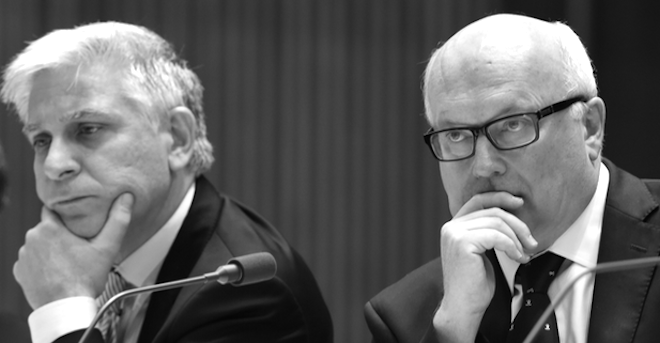Attorney General's Department now says Chris Moraitis briefcase has not been lost ... Where are the notes about the Triggs job offer? ... FOI request for details turned down, with the department saying it is too busy with pressing duties
 Has anyone seen Christos' briefcase?
Has anyone seen Christos' briefcase?
WHAT is going on with Christos Moraitis' briefcase? Has it been mistakenly lost, or not? The mystery deepens.
You'll remember that Moraitis, the secretary of the attorney general's department in Canberra, told a senate committee in February that his notes of conversations with Gorgeous George Brandis and Prof. Gillian Triggs were "lost".
The notes concerned discussions about a job offer to the pesky president of the Human Rights Commission.
This was around the time there was talk that the offer of alternate employment may amount to an improper inducement to Triggs, as a way of cauterising the strife she was causing with the Forgotten Children report.
Christos told the Legal and Constitutional Affairs Legislation Committee on February 24:
"I had taken some notes of my discussion with the attorney and also annotated those notes after my discussion with Professor Triggs. I had those notes for a while and unfortunately I have travelled to three countries in two weeks and I have lost those notes, losing my briefcase by mistake. I am sorry."
He also said the notes could have been in folders that may also have been lost. It's all a bit unclear. In any event, it was a setback for Sgt Plod of the AFP who was supposed to be investigating the inducement angle.
Queensland barrister Alex McKean made an FOI application to the AG's department seeking documents created by Moraitis and Brandis relating to Triggs and/or the HRC inquiry into children in detention and any records that might relate to the loss of the briefcase - specifically:
• Any notification, report or other communication from Mr Moraitis, or on his behalf;
• Steps taken to comply with the security governance guidelines published by the department, in particular:
• whether the loss has been classified as a major security incident, security incident or security infringement;
• the time and place of the loss;
• the circumstances of the loss;
• the types of official resources suspected to have been lost;
• whether the loss was deliberate or accidental ...
• any efforts made by Mr Moraitis, or on his behalf, to inform Prof Triggs of the loss of notes of a confidential discussion with prof Triggs.
McKean also asked for Moraitis' diary, including details of his travel. The FOI request was for documents spanning the period September 1, 2014 to February 29, 2015. Moraitis actually became Secretary of the department on September 22, 2014
Back came the response from first assistant secretary Sarah Chidgey, who denied the request on "practical refusal" grounds. She invited McKean to revise his application to narrow down the documents he was seeking. She added:
"To assist you to revise the scope of your request I can advise that the Secretary, Mr Moraitis, did not lose a briefcase during the period September 1, 2014 to February 28, 2015."
Has the Secretary sought to return to the senate committee to clarify his earlier evidence? It's all rather strange.
 Moraitis and Brandis: contemplating the unfortunate loss of Triggs' job offer notes
Moraitis and Brandis: contemplating the unfortunate loss of Triggs' job offer notes
Access to the Secretary's diary seemed to cause the greatest headache for the department's FOI brigade. The diary is kept as an electronic database, using Microsoft Outlook. Sarah explained:
"The Secretary works at least five days each week, though often more. On any given day, the Secretary has on average 32 meetings and other engagements a week. On that basis I estimate that a document containing the information about the Secretary's engagements for the period would contain approximately 725 separate appointment entries [for the five months and one week he has been head of the department]."
A decision about disclosure would have to be made about each appointment entry. This would involve "extensive consultations with the Secretary's executive adviser, and in many instances, the Secretary himself".
She estimated that 190 individuals and representatives of government, community or commercial organisations referred to in the diary entries would have to be consulted.
"I consider two hours for each consultation to be a reasonable estimate of the time required to consult with third parties. Based on this, I estimate it would require approximately 380 hours of staff time to conduct consultations prior to making a decision about disclosure of material in the Secretary's diary for the period 22 September 2014 to 28 February 2015."
This estimation took into account:
- The time to generate, locate and collate the requested documents;
- The Secretary's role as the most senior officer in the AG's department;
- The need for the Secretary or his executive advisor to inspect each of the 1,170 appointment entries;
- The resources necessary to consult with other Commonwealth agencies regarding materials affecting law enforcement, protection of public safety, national security, defence, international relations or Cabinet deliberations;
- The resources necessary to consult State government agencies about material that may affect Commonwealth-State relations;
- The resources necessary to consult individuals and business organisations.
In all the FOI request would require "in excess of 400 hours of time of officers of the department".
All of which gave rise to a "practical refusal reason". To fulfil McKean's request would divert the resources of the department from vital activities, such as spying on the entire nation and working out ways to harass the community legal sector.